JUMP to the end to add your own recommendation . . .
(most recent added first)
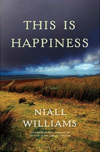 Lynne: This is Happiness is a beautifully written story of an older man looking back on his youth. It takes place in the early 1970s when electricity was first being brought to a remote village in rural Ireland.
Lynne: This is Happiness is a beautifully written story of an older man looking back on his youth. It takes place in the early 1970s when electricity was first being brought to a remote village in rural Ireland.
Joan: I’ve read two of Katherine Heiny’s book this year, Standard Deviation and Early Morning Riser. 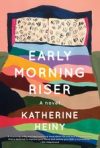
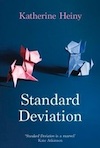
They are not packed with action, but describe marriage and parenting and the struggles of ordinary life in such real ways. There are many “imperfect” people in her characters which make them feel so real. She’s also got an acute sense of humor which leavens the books in a very pleasing way.
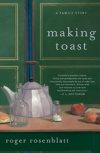 Paula: I continue to be in love with memoirs and recently read one of my favorites: Making Toast by Roger Rosenblatt. I love Rosenblatt’s simple, honest way of writing. He chooses the fewest words that make the most impact on the readers understanding of what he is trying to get across. In this book his daughter, Amy, dies suddenly when her three children are very young and she is in the prime of her life as a doctor and mother. Life for everyone is disrupted and in total but restrained despair as they navigate this new family reality. The title explains, but understates, Rosenblatt’s role in the now blended family. I came away feeling I can handle anything that life throws my way.
Paula: I continue to be in love with memoirs and recently read one of my favorites: Making Toast by Roger Rosenblatt. I love Rosenblatt’s simple, honest way of writing. He chooses the fewest words that make the most impact on the readers understanding of what he is trying to get across. In this book his daughter, Amy, dies suddenly when her three children are very young and she is in the prime of her life as a doctor and mother. Life for everyone is disrupted and in total but restrained despair as they navigate this new family reality. The title explains, but understates, Rosenblatt’s role in the now blended family. I came away feeling I can handle anything that life throws my way.
Christina: I’ve recently read the eighteenth-century send-up Blindspot by Kamensky and Lepore (both historians). 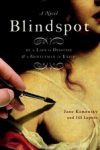 I’ve never read anything so intriguing and broad in scope: gender, cross-dressing, mystery, slave trade, American colonial history, the art of painting and perspective, laced with literary allusions and blended with the hottest sex scenes, which startled this chaste reader.
I’ve never read anything so intriguing and broad in scope: gender, cross-dressing, mystery, slave trade, American colonial history, the art of painting and perspective, laced with literary allusions and blended with the hottest sex scenes, which startled this chaste reader.
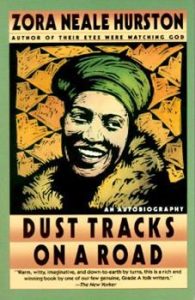 Lily: I just finished Dust Tracks on a Road, the autobiography of Zora Neale Hurston (prominent writer during the Harlem Renaissance, best known for “Their Eyes Were Watching God”). Dust Tracks is a deeply personal memoir about Hurston’s experience becoming aware of race, religion, gender, and storytelling as she grew up in Eatonville, Florida, the first all-black incorporated town in America. With Hurston’s signature wit and poetic prose, “Dust Tracks” is a fantastic read.
Lily: I just finished Dust Tracks on a Road, the autobiography of Zora Neale Hurston (prominent writer during the Harlem Renaissance, best known for “Their Eyes Were Watching God”). Dust Tracks is a deeply personal memoir about Hurston’s experience becoming aware of race, religion, gender, and storytelling as she grew up in Eatonville, Florida, the first all-black incorporated town in America. With Hurston’s signature wit and poetic prose, “Dust Tracks” is a fantastic read.
Justin: I really liked Klara and Sun, a recent novel by Kazuo Ishiguro. 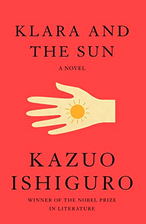 It is about the relationship between a family and an “artificial friend” (AI) that they buy as a companion for a sick child. It tells the story from the perspective of the AI, Klara, who is a bit obtuse about her own inner life and those of other people in ways that are really interesting and get you thinking. It does not feel like sci-fi, but everyone in my family found it a real page turner.
It is about the relationship between a family and an “artificial friend” (AI) that they buy as a companion for a sick child. It tells the story from the perspective of the AI, Klara, who is a bit obtuse about her own inner life and those of other people in ways that are really interesting and get you thinking. It does not feel like sci-fi, but everyone in my family found it a real page turner.
Briggs: Two books I can recommend are A Gentleman in Moscow by Amor Towles and The Order by Daniel Silva.
In A Gentleman in Moscow, a charming character, under “hotel arrest” during Stalin’s reign, adapts to reduced (in several dimensions) circumstances with sly grace and joie de vivre.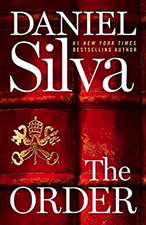
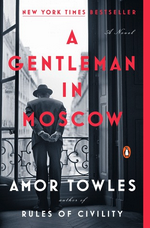
In The Order, an Israeli spymaster solves a murder connected to the secret order of Vatican cardinals, touching on roots of Catholic antisemitism in ancient lost Gospel in a fast-paced, violent, and historically erudite thriller.
I also recommend The Land Where Lemons Grow: The story of Italy and its citrus fruit, by Helena Attlee (featuring Borgias, lemon gardens, mafia, and recipes from a British former tour guide); Entangled Life (not your average scientist, 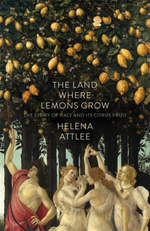 Sheldrake combines autobiography, journalism, and biogenetics to reveal how fungi are the quintessential connectors of planet earth); and Piranesi by Susannah Clarke (a mysterious and bewildering Piranesian labyrinth is inhabited by a lone amnesiac who slowly discovers who he is, with many philosophical turns & imaginative twists).
Sheldrake combines autobiography, journalism, and biogenetics to reveal how fungi are the quintessential connectors of planet earth); and Piranesi by Susannah Clarke (a mysterious and bewildering Piranesian labyrinth is inhabited by a lone amnesiac who slowly discovers who he is, with many philosophical turns & imaginative twists).
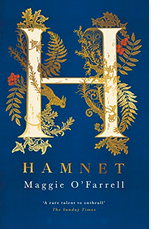 Alice: I loved the novel Hamnet by Maggie O’Farrell — it’s so different than anything else I’ve ever read. The depiction of Shakespeare’s family is fascinating, the writing is beautiful, plus it has the most spectacular sex scene I’ve ever read! The last scene really swept me away.
Alice: I loved the novel Hamnet by Maggie O’Farrell — it’s so different than anything else I’ve ever read. The depiction of Shakespeare’s family is fascinating, the writing is beautiful, plus it has the most spectacular sex scene I’ve ever read! The last scene really swept me away.
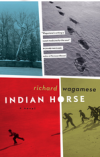 Julie: My current recommendation is Indian Horse. Richard Wagamese writes this heartbreaking story of a young First Nations boy that somehow manages to be devastating and hopeful and the same time. Beautiful writing and wonderfully rendered characters make this a quick, engaging read!
Julie: My current recommendation is Indian Horse. Richard Wagamese writes this heartbreaking story of a young First Nations boy that somehow manages to be devastating and hopeful and the same time. Beautiful writing and wonderfully rendered characters make this a quick, engaging read!
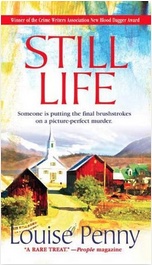 Yvonne: I’m deep into Louise Penny’s mystery series. I love the intellectual journey and the emotional journey, and the small town sensibility.
Yvonne: I’m deep into Louise Penny’s mystery series. I love the intellectual journey and the emotional journey, and the small town sensibility.
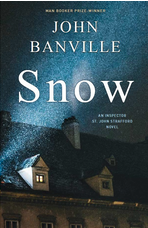 Chris: Snow, by John Banville, destroys the form of the murder mystery – in a good way! It features an upper class detective who is not that good with people, and yet he has his own (excellent) intuitions. The novel is basically reinventing noir.
Chris: Snow, by John Banville, destroys the form of the murder mystery – in a good way! It features an upper class detective who is not that good with people, and yet he has his own (excellent) intuitions. The novel is basically reinventing noir.
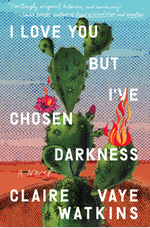 Malena: I recently read I Love You but I’ve Chosen Darkness by Claire Vaye Watkins, about a mother suffering from post-partum depression. It has thrillingly acrobatic sentences, and its combination of poetical and vernacular is very cool.
Malena: I recently read I Love You but I’ve Chosen Darkness by Claire Vaye Watkins, about a mother suffering from post-partum depression. It has thrillingly acrobatic sentences, and its combination of poetical and vernacular is very cool.
Richard: I really enjoyed The Song of Achilles by Madeline Miller. 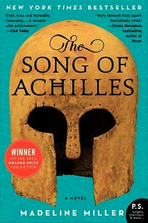
Miller did a great job of making an old story new again. It’s highly engaging, and full of insights about both the historical subject matter and our own contemporary condition. Who would have thought of the Iliad as a delicate love story overwhelmed by the exigencies of the political world?
What wonderful book have you recently read? Why did you love it?